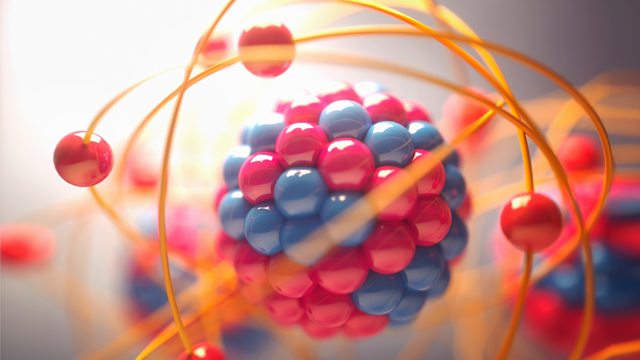The Proton
Melvyn Bragg and guests discuss the growing understanding of the Proton, found in the nuclei of all elements and, with three quarks, balancing the charge of a single electron.
Melvyn Bragg and guests discuss the discovery and growing understanding of the Proton, formed from three quarks close to the Big Bang and found in the nuclei of all elements. The positive charges they emit means they attract the fundamental particles of negatively charged electrons, an attraction that leads to the creation of atoms which in turn leads to chemistry, biology and life itself. The Sun (in common with other stars) is a fusion engine that turn protons by a series of processes into helium, emitting energy in the process, with about half of the Sun's protons captured so far. Hydrogen atoms, stripped of electrons, are single protons which can be accelerated to smash other nuclei and have applications in proton therapy. Many questions remain, such as why are electrical charges for protons and electrons so perfectly balanced?
With
Frank Close
Professor Emeritus of Physics at the University of Oxford
Helen Heath
Reader in Physics at the University of Bristol
And
Simon Jolly
Lecturer in High Energy Physics at University College London
Producer: Simon Tillotson.
Last on
LINKS AND FURTHER READING
听
READING LIST:
Jon Butterworth, A Map of the Invisible: Journeys into Particle Physics (William Heinemann, 2017)
Frank Close, The New Cosmic Onion: Quarks and the Nature of the Universe (CRC Press, 2017)
Frank Close, The Infinity Puzzle: Quantum Field Theory and the Hunt for an Orderly Universe (Basic Books, 2013)
Frank Close, Michael Marten and Christine Sutton, The Particle Odyssey: A Journey to the Heart of Matter (Oxford University Press, 2004)
Richard Feynman, Six Easy Pieces: Essentials of Physics Explained by Its Most Brilliant Teacher (first published 1994; Basic Books, 2011)
George Gamow, Mr Tompkins in Paperback (first published 1946; Cambridge University Press, 1993)
James Gleick, Genius: Richard Feynman and Modern Physics (Abacus, 1994)
Gavin Hesketh, The Particle Zoo: The Search for the Fundamental Nature of Reality (Quercus, 2017)
Chad Orzel: How to Teach Quantum Physics to Your Dog (Oneworld Publications, 2010)
Jim Ottaviani, Feynman (First Second, 2013)
Jim Ottaviani and Leland Purvis, Suspended in Language: Niels Bohr鈥檚 Life, Discoveries, and the Century he Shaped (G.T. Labs, 2009)
Anton Radevsky and Emma Sanders, The Large Hadron Collider Pop-Up Book: Voyage to the Heart of Matter (Papadakis, 2013 - intended for children)
Steven Weinberg, The First Three Minutes: A Modern View of the Origin of the Universe (first published 1977; Basic Books, 1993)
听
Credits
| Role | Contributor |
|---|---|
| Presenter | Melvyn Bragg |
| Interviewed Guest | Frank Close |
| Interviewed Guest | Helen Heath |
| Interviewed Guest | Simon Jolly |
| Producer | Simon Tillotson |
Broadcasts
- Thu 26 Apr 2018 09:00大象传媒 Radio 4
- Thu 26 Apr 2018 21:30大象传媒 Radio 4
Featured in...
![]()
20th Century—In Our Time
Browse the 20th Century era within the In Our Time archive.
![]()
Science—In Our Time
Scientific principles, theory, and the role of key figures in the advancement of science.
In Our Time podcasts
Download programmes from the huge In Our Time archive.
The In Our Time Listeners' Top 10
If you鈥檙e new to In Our Time, this is a good place to start.
Arts and Ideas podcast
Download the best of Radio 3's Free Thinking programme.
Podcast
-
![]()
In Our Time
Melvyn Bragg and guests discuss the ideas, people and events that have shaped our world.



